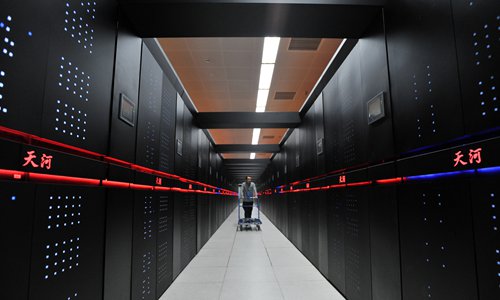HOME >> BUSINESS
US block spurs tech independence drive by Chinese companies
By Huang Ge Source:Global Times Published: 2019/6/23 21:48:39
US block spurs tech independence drive

A worker checks the TH-2 High Performance Computer System in a lab in Guangzhou, capital of South China's Guangdong Province. File photo: VCG
The latest US blacklisting of the Chinese supercomputing companies will not reduce domestic technology companies' resolve to pursue innovation and research and development (R&D) as they strive to make up for shortcomings in certain segments to pursue further growth despite "irrational assaults" by Washington, industry insiders said.The US Commerce Department said on Friday it was adding five Chinese companies to an "entity list," citing so-called national security concerns.
The entities are some of China's leading supercomputer makers - Sugon, the Wuxi Jiangnan Institute of Computing Technology, semiconductor company Higon, Chengdu Haiguang Integrated Circuit and Chengdu Haiguang Microelectronics Technology, according to a filing released by the US department.
The list would ban the Chinese companies from buying US components without US government approval. The relevant decision was scheduled to take effect on Monday, media reports said.
The move represents another unilateral sanction on Chinese companies after the US put Huawei Technologies Co and 70 of its affiliates on an entity list in May.
It also comes before a scheduled meeting between President Xi Jinping and US President Donald Trump later this week at the G20 summit in Japan to discuss bilateral trade differences.
Coming at this time, the US crackdown is likely aimed at increasing pressure on China to gain more bargaining chips for the upcoming trade and economic talks, Chinese experts said.
They also noted that like its ongoing curbs on Huawei, the US block on the Chinese supercomputing industry is intended to cut the supply chain of Chinese supercomputer makers to further weaken the nation's technological and economic development.
"The US-initiated trade war and the country's continuous crackdown on China's technology sector showed America's obvious ill intention - to keep its hegemony in the world market," said Zhuang Rui, deputy dean of the University of International Business and Economics' Institute of International Economics in Beijing.
The rise of China's advanced technology sector in recent years, including segments such as 5G and supercomputing, has made the US feel rising pressure, experts said.
China continues to claim the largest number of supercomputers on a global Top 500 list, with 219 systems, or 43.8 percent of the total, followed by the US with 116, and Japan third with 29, according to an industry ranking released on June 17 in Frankfurt, Germany.
The US has long been curbing the growth of China's supercomputing sector by restricting sales of products to Chinas, which drove Chinese companies to develop their own technology and seek growth on a large scale, Fu Liang, a Beijing-based independent industry analyst, told the Global Times on Sunday.
After the US banned Intel to export Xeon Phi chip to China's supercomputing industry in April 2015, China's self-developed supercomputers beat the US' supercomputers in computing speed in 2016.
The latest Chinese additions to the US blacklist are likely to be affected in the short term as their supply chain will be interrupted, Fu said.
But it will also push them to find alternatives and pursue independent R&D to overcome shortcomings in the sector, he said.
According to a statement Sugon filed with the Shanghai Stock Exchange on late Sunday, the company is verifying relevant content, comprehensively evaluating the impact of the ban and making preparations.
Independent growth
Competition between the Chinese and US advanced manufacturing and technology sectors has intensified in recent years, but the US is headed in the wrong direction, which is one intended to "maintain its competitiveness by attacking its competitors," Zhuang told the Global Times on Sunday.
"To confront the continuous US pressure, Chinese technology companies have realized that only by focusing on independent innovation and R&D, can they gain autonomy in the industry," she said.
Now the US is targeting Chinese industries that need support from US suppliers, and such restrictions will likely to extend to more sectors in which China has performed well on a global basis, such as biotechnology, Fu said.
But because China has a large market and is building up resources in areas such as capital and talent in industries like high-speed internet, he said, "the country will be able to find other solutions independent of the US."
"Education matters in the process," Zhuang said, noting that China is expected to put more focus on nurturing technology specialists.
Experts also said that US companies that threaten the interests of Chinese companies could possibly be added to China's "unreliable entity list."
China announced on May 31 that it would establish an "Unreliable Entity List" of foreign companies and individuals that block or cut supplies to Chinese companies for non-commercial purposes, and seriously damage the legitimate rights and interests of Chinese enterprises.
Shares of US semiconductor companies tumbled on Friday after the Commerce Department announced its latest attack targets. Advanced Micro Devices fell 3.03 percent, Xilinx dropped 2.28 percent and Nvidia was down 1.52 percent.
Newspaper headline: US block spurs tech independence drive
Posted in: INDUSTRIES,COMPANIES,BIZ FOCUS